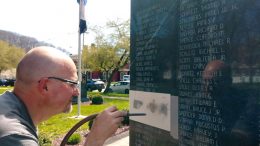If we do our jobs right and continue to tell the story, said Karen Parsh, of St. Paul’s Lutheran Church in Knox, speaking Monday night in the Knox Fire Hall. (I’m paraphrasing) Then, little children asking their parents who Ross McGinnis was – as they enter the Knox, Pennsylvania, United States Post Office that now bears his name – will soon hear exactly who he was and why it’s important that his name is now affixed forever in bronze in their town.
I covered a ceremony Monday held in the Knox fire hall. I wasn’t working for the paper 10 years ago when Ross McGinnis died in Iraq. I didn’t know what to expect.
I didn’t expect the eyes to shed as many tears as they assuredly did 10 years ago, or 9, or 8 … Each year I’m sure fewer tears are shed.
The pastor’s words struck me. If we do our jobs right and continue to tell the story. That’s a powerful powerful thing to say.
How many times do our stories get lost or just relegated to a occasional stumble upon by a history buff or a collector coming across a box of family mementos the next generations no longer knows what to do with or even what they represented.
I looked at some of the old veterans in the room paying honor to one of their own. Some, actually most, were from a completely different era, but they are brothers and sisters to McGinnis. I wondered about their story and how much their family even knows about their lives and service. I know many older vets who don’t want to talk about it. But silence doesn’t mean the stories don’t exist.
It’s easy to say the stories live on in the families, but I know they don’t always. We each live our own story and sometimes the stories of others begin to fade.
Heck, even our own stories we have told for years fade as we either grow tired of telling them or no one is there to listen to them.
So this statement by the pastor is quite the thing. If we do our jobs right!
For some, having their story told even 10 years after they died is pretty remarkable. I was thinking of my grandfather who died almost 20 years ago and he does come up from time to time, but after 20 years he is becoming just a name in the stories as they are now told to people who can’t put his face to the name. And, sadly, I bring him up less than I did 10 or 15 years ago.
And even with a photograph of him, knowing my grandfather as I did just cannot come through in the stories to people who never met him. And after I’m gone, I wonder if his memory will exist? Certainly if it does in my nieces and nephews, it’ll be a mere spec of my memory of him.
I was thinking about this young man’s parents sitting there tonight listening to people honor their son. What is in their mind? It’s been 10 years that they have lived without him. Without his phone calls, or perhaps stopping by to see them unexpectedly. In 10 years, he could’ve been married and given them grandchildren that they could spoil.
But instead they have stories that don’t go beyond Dec. 4, 2006, when he made a choice to put his life at extreme risk in order to save others (story below.)
Their stories since then have been to cope with this loss and be reminded of it over and over again by these honors given to their son for his sacrifice and incredible bravery. They are proud of him, as is the entire community as evidenced by these honors. I didn’t watch the slideshow that was made about their son, instead I watched them. I knew it was 10 years ago, but as certain images came on screen I saw different reactions. Some were hard for them to look at, I could tell, and some made people laugh.
I wasn’t sure why I wanted to watch them, but I was sure I needed to. As journalists, we often have a disconnect to our subject matter – it’s usually a defense mechanism of sorts, but to me it’s also important for us to be able to bear witness through our own emotions in a way that we can hopefully show the proper empathetic observation without becoming cliche or just show an image to prove we were there. We need to find a way to understand and not just snap a picture and leave.
I want to document the event in its roundness of emotion and honor. It’s the least I can do to give it my full attention.
In hopes that by doing so, the historical significance can be felt even in years to come by generations that didn’t know these two parent’s son or this community’s friend and hero.
And that a couple photographs and a story can hopefully do a little part in what the pastor was asking us to do. And what the Post Office wall will hopefully perpetuate for years to come.
The following is from www.army.mil. There is more information on this website.
Ross Andrew McGinnis was born June 14, 1987, in Meadville, PA. His family moved to Knox, northeast of Pittsburgh, when he was three. There he attended Clarion County public schools, and was a member of the Boy Scouts as a boy. Growing up he played basketball and soccer through the YMCA and Little League baseball. Ross was a member of the St. Paul’s Lutheran Church in Knox, and a 2005 graduate of Keystone Junior-Senior High School.
Ross’s interests included video games and mountain biking. He was also a car enthusiast, and took classes at the Clarion County Career Center in automotive technology. He also worked part-time at McDonald’s after school.
His mother, Romayne, said Ross wanted to be a Soldier early in life. When asked to draw a picture of what he wanted to be when he grew up, Ross McGinnis, the kindergartner, drew a picture of a Soldier.
On his 17th birthday, June 14, 2004, Ross went to the Army recruiting station and joined through the delayed entry program.

Spc. Ross Andrew McGinnis will receive the Medal of Honor posthumously during a White House ceremony June 2, 2008.
After initial entry training at Fort Benning, Georgia, McGinnis was assigned to 1st Battalion, 26th Infantry Regiment in Schweinfurt, Germany. According to fellow Soldiers, he loved Soldiering and took his job seriously, but he also loved to make people laugh. One fellow Soldier commented that every time McGinnis left a room, he left the Soldiers in it laughing.
The unit deployed to Eastern Baghdad in August 2006, where sectarian violence was rampant. Ross was serving as an M2 .50 caliber machine gunner in 1st Platoon, C Company, 1st Battalion, 26th Infantry Regiment is support of operations against insurgents in Adhamiyah, Iraq.
According to the official report, on the afternoon of Dec. 4, 2006, McGinnis’ platoon was on mounted patrol in Adhamiyah to restrict enemy movement and quell sectarian violence. During the course of the patrol, an unidentified insurgent positioned on a rooftop nearby threw a fragmentation grenade into the Humvee. Without hesitation or regard for his own life, McGinnis threw his back over the grenade, pinning it between his body and the Humvee’s radio mount. McGinnis absorbed all lethal fragments and the concussive effects of the grenade with his own body. McGinnis, who was a private first class at the time, was posthumously promoted to specialist. Spc. McGinnis’s heroic actions and tragic death are detailed in the battlescape section of this website and in his Medal of Honor Citation.
Army Decorations: Medal of Honor, Silver Star, Bronze Star, Purple Heart, Army Good Conduct Medal, National Defense Service Medal, Iraq Campaign Medal, Global War on Terrorism Service Medal, Army Service Ribbon, Overseas Service Ribbon and Combat Infantryman Badge.
It is up to us to tell these stories.
NOTE: The Pastor’s name is Karen Parsh of St. Paul’s Lutheran Church in Knox. I did not have this information with me when I wrote this blog.
























































